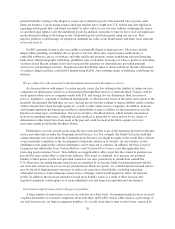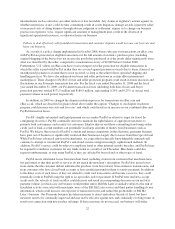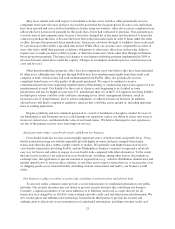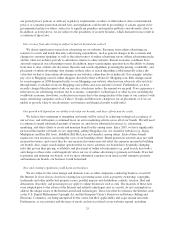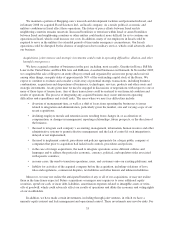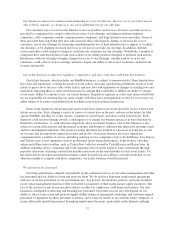eBay 2009 Annual Report Download - page 37
Download and view the complete annual report
Please find page 37 of the 2009 eBay annual report below. You can navigate through the pages in the report by either clicking on the pages listed below, or by using the keyword search tool below to find specific information within the annual report.and territories do not currently regulate money transmitters. As a licensed money transmitter, PayPal is subject to
restrictions on its investment of customer funds, reporting requirements, bonding requirements, and inspection by
state regulatory agencies. If PayPal were found to be in violation of money services laws or regulations, PayPal
could be subject to liability, forced to cease doing business with residents of certain states, forced to change its
business practices, or required to obtain additional licenses or regulatory approvals that could impose a
substantial cost on PayPal. Any change to PayPal’s business practices that makes the service less attractive to
customers or prohibits its use by residents of a particular jurisdiction could decrease the velocity of trade on
eBay, which would further harm our business.
Although there have been no definitive interpretations to date, PayPal has assumed that its service is subject
to the Electronic Fund Transfer Act and Regulation E of the U.S. Federal Reserve Board. As a result, among
other things, PayPal must provide advance disclosure of changes to its service, follow specified error resolution
procedures and reimburse consumers for losses above $50 from transactions not authorized by the consumer.
PayPal currently voluntarily reimburses consumers for all financial losses from transactions not authorized by the
consumer, not just losses above $50. PayPal seeks to pass most of these losses on to the relevant merchants, but
PayPal incurs losses if the merchant does not have sufficient funds in its PayPal account.
Our Bill Me Later service is similarly subject to a variety of laws and regulations. Although Bill Me Later
does not originate loans, one or more jurisdictions may conclude that Bill Me Later is a lender or money
transmitter or loan broker, which could subject us to liability or regulation in one or more jurisdictions.
Additionally, federal regulators could mandate changes to the relationship between Bill Me Later and CIT Bank,
the financial institution that Bill Me Later relies on to extend credit to customers with the Bill Me Later service.
Any termination or interruption of CIT Bank’s lending services to consumers could result in an interruption of
Bill Me Later services, as described under the caption “Bill Me Later’s operations depend on lending services
provided by CIT Bank” above. Also, effective February 2010, certain provisions of the Credit Card
Accountability Responsibility and Disclosure Act of 2009, or the CARD Act, will require CIT Bank to make
fundamental changes to many of the practices currently used with respect to Bill Me Later consumer accounts,
including marketing, pricing (including finance charges and fees assessed on receivables purchased by CIT
Bank) and billing, which could in turn have an adverse affect on Bill Me Later’s business.
Changes to credit card networks or bank fees, rules, or practices could harm PayPal’s business.
PayPal does not belong to or directly access credit card networks, such as Visa and MasterCard. As a result,
PayPal must rely on banks or other payment processors to process transactions, and must pay fees for this
service. From time to time, credit card networks have increased, and may increase in the future, the interchange
fees and assessments that they charge for each transaction using one of their cards. PayPal’s credit card
processors have the right to pass any increases in interchange fees and assessments on to PayPal as well as
increase their own fees for processing. These higher fees increase PayPal’s operating costs and reduce its profit
margins. PayPal is also required by its processors to comply with credit card network operating rules, and PayPal
has agreed to reimburse its processors for any fines they are assessed by credit card networks as a result of any
rule violations by PayPal or PayPal’s customers. The credit card networks set and interpret the credit card rules.
Credit card networks could adopt new operating rules or re-interpret existing rules that PayPal or its processors
might find difficult or even impossible to follow. As a result, PayPal could lose its ability to give customers the
option of using credit cards to fund their payments. If PayPal were unable to accept credit cards, its business
would be seriously damaged. In addition, the velocity of trade on eBay could decrease and our business would
further suffer.
PayPal is required to comply with credit card networks’ special operating rules for Internet payment
services. PayPal and its credit card processors have implemented specific business processes for merchant
customers in order to comply with these rules, but any failure to comply could result in fines, the amount of
which would be within the credit card networks’ discretion. PayPal also could be subject to fines from credit card
networks if it fails to detect that merchants are engaging in activities that are illegal or that are considered “high
29



